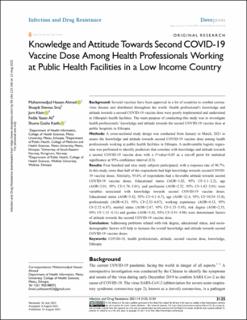| dc.contributor.author | Ahmed, Mohammedjud Hassen | |
| dc.contributor.author | Shemsu Siraj, Shuayib | |
| dc.contributor.author | Klein, Jörn | |
| dc.contributor.author | Gosha Kanfe, Shuma | |
| dc.date.accessioned | 2021-09-02T11:07:59Z | |
| dc.date.available | 2021-09-02T11:07:59Z | |
| dc.date.created | 2021-08-11T12:13:53Z | |
| dc.date.issued | 2021 | |
| dc.identifier.citation | Ahmed, M. H., Siraj, S. S., Klein, J., Ali, F. Y., & Kanfe, S. G. (2021). Knowledge and Attitude Towards Second COVID-19 Vaccine Dose Among Health Professionals Working at Public Health Facilities in a Low Income Country. Infection and drug resistance, 14, 3125–3134 | en_US |
| dc.identifier.issn | 1178-6973 | |
| dc.identifier.uri | https://hdl.handle.net/11250/2772538 | |
| dc.description.abstract | Background: Several vaccines have been approved in a lot of countries to combat coronavirus disease and distributed throughout the world. Health professional’s knowledge and attitude towards a second COVID-19 vaccine dose were poorly implemented and understood in Ethiopia's health facilities. The main purpose of conducting this study was to investigate health professionals’ knowledge and attitude towards the second COVID-19 vaccine dose at public hospitals in Ethiopia.
Methods: A cross-sectional study design was conducted from January to March, 2021 to assess the knowledge and attitude towards second COVID-19 vaccine dose among health professionals working at public health facilities in Ethiopia. A multivariable logistic regression was performed to identify predictors that correlate with knowledge and attitude towards a second COVID-19 vaccine dose with a P-value<0.05 as a cut-off point for statistical significance at 95% confidence interval (CI).
Results: Four hundred and nine study subjects participated, with a response rate of 96.7%. In this study, more than half of the respondents had high knowledge towards second COVID-19 vaccine doses. Similarly, 95.6% of respondents had a favorable attitude towards second COVID-19 vaccine doses. Educational status (AOR=1.82, 95% CI=1.1–2.2), age (AOR=2.01, 95% CI=1.76–3.01), and profession (AOR=2.32, 95% CI=1.42–3.01) were variables associated with knowledge towards second COVID-19 vaccine doses. Educational status (AOR=5.42, 95% CI=4.1–6.7), age (AOR=12.4, 95% CI=10.54–15.8), professionals (AOR=4.33, 95% CI=2.32–6.87), working experience (AOR=4.33, 95% CI=2.32–6.87), marital status (AOR=2.47, 95% CI=1.33–5.95), risk degree (AOR=2.33, 95% CI=1.31–4.11) and gender (AOR=3.42, 95% CI=2.91–4.98) were determinant factors of attitude towards the second COVID-19 vaccine dose.
Conclusion: Addressing problems related with risk degree, educational status, and socio-demographic factors will help to increase the overall knowledge and attitude towards second COVID-19 vaccine doses. | en_US |
| dc.language.iso | eng | en_US |
| dc.rights | Navngivelse-Ikkekommersiell 4.0 Internasjonal | * |
| dc.rights.uri | http://creativecommons.org/licenses/by-nc/4.0/deed.no | * |
| dc.title | Knowledge and attitude towards Second COVID-19 vaccine Dose among health professionals working at public health facilities in a low Income Country | en_US |
| dc.type | Journal article | en_US |
| dc.type | Peer reviewed | en_US |
| dc.description.version | publishedVersion | en_US |
| dc.rights.holder | © 2021 Ahmed et al. | en_US |
| dc.source.pagenumber | 3125–3134 | en_US |
| dc.source.volume | 14 | en_US |
| dc.source.journal | Infection and Drug Resistance | en_US |
| dc.identifier.doi | https://doi.org/10.2147/IDR.S327954 | |
| dc.identifier.cristin | 1925296 | |
| cristin.ispublished | true | |
| cristin.fulltext | original | |
| cristin.qualitycode | 1 | |

